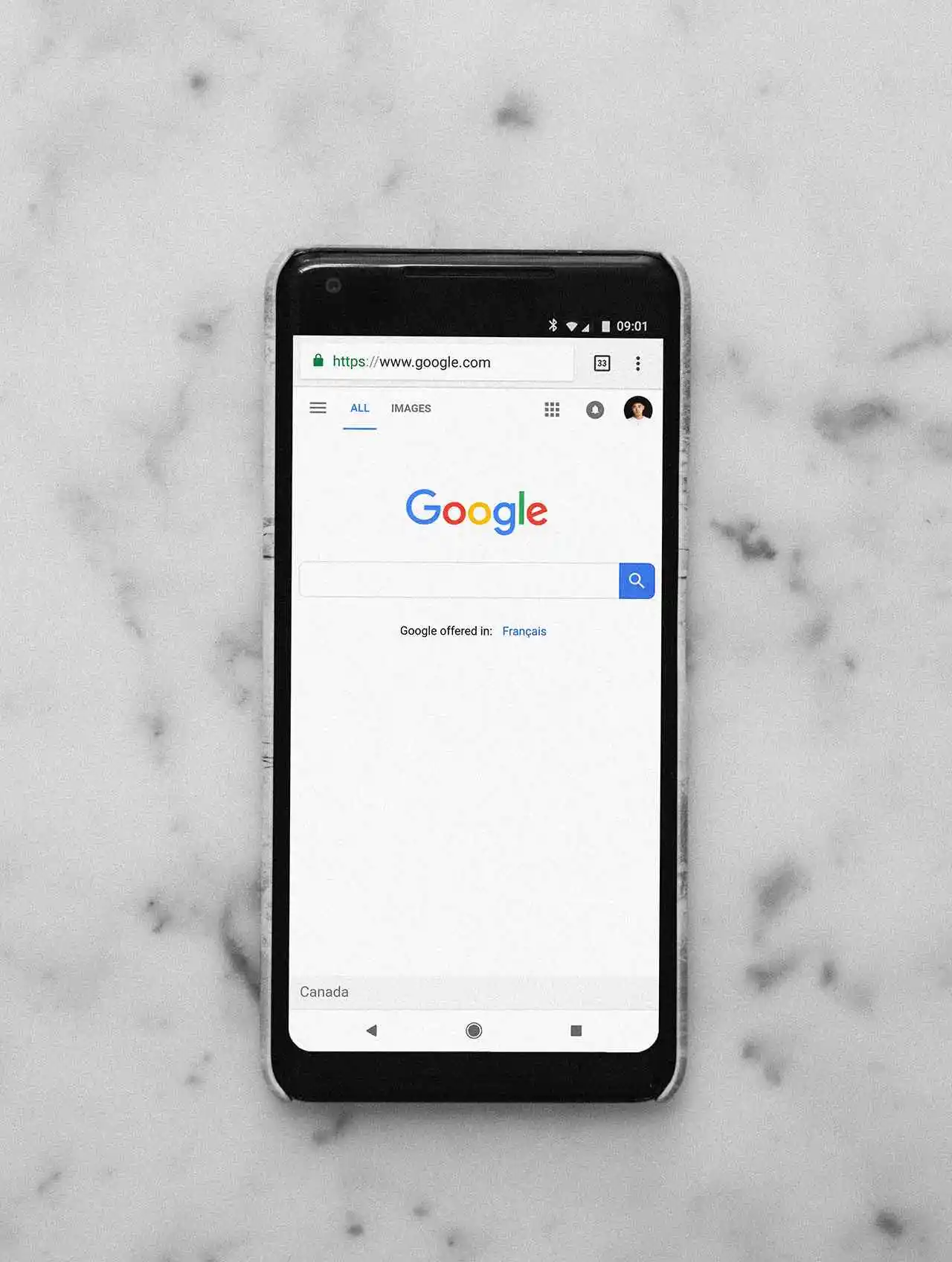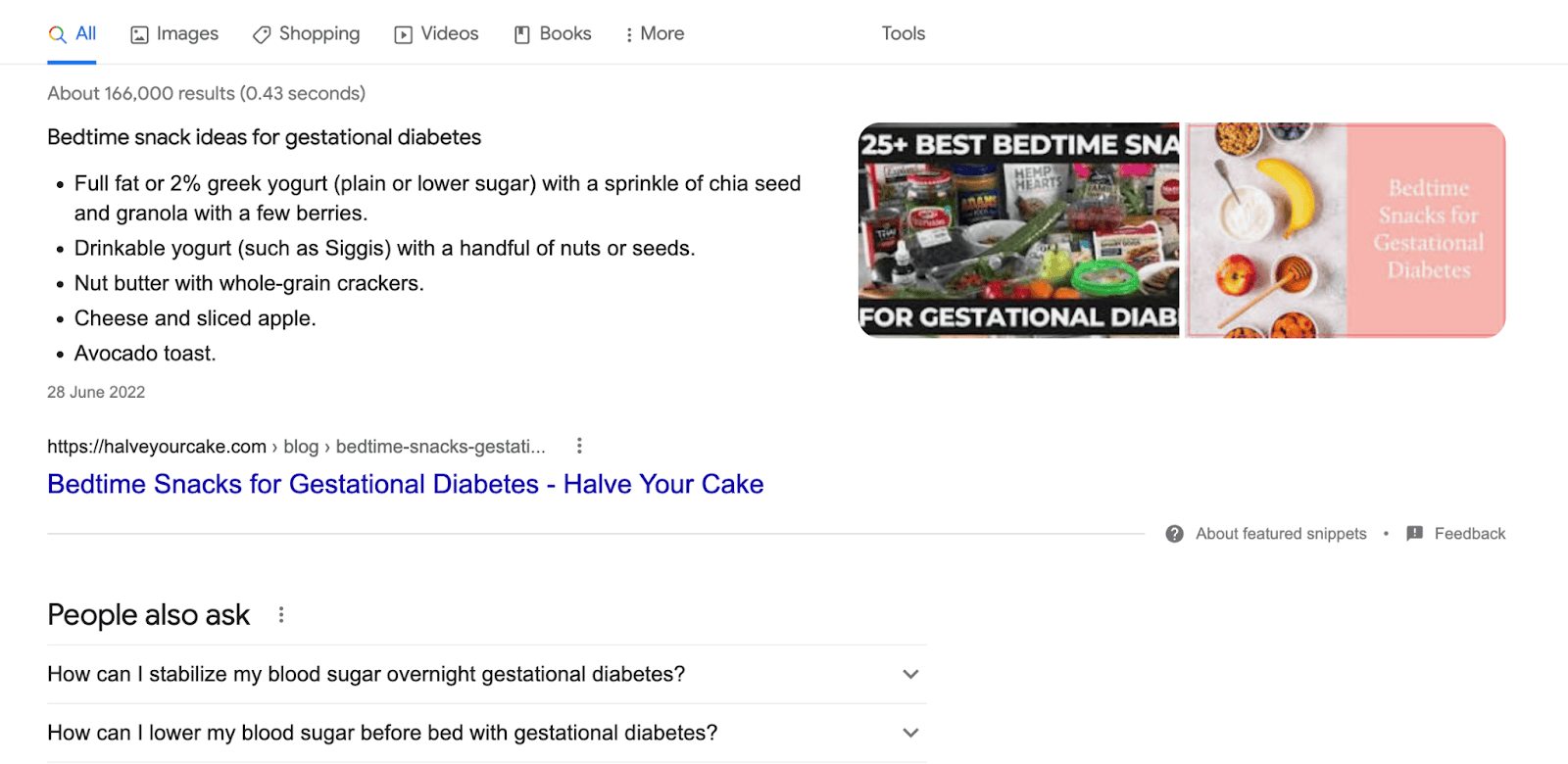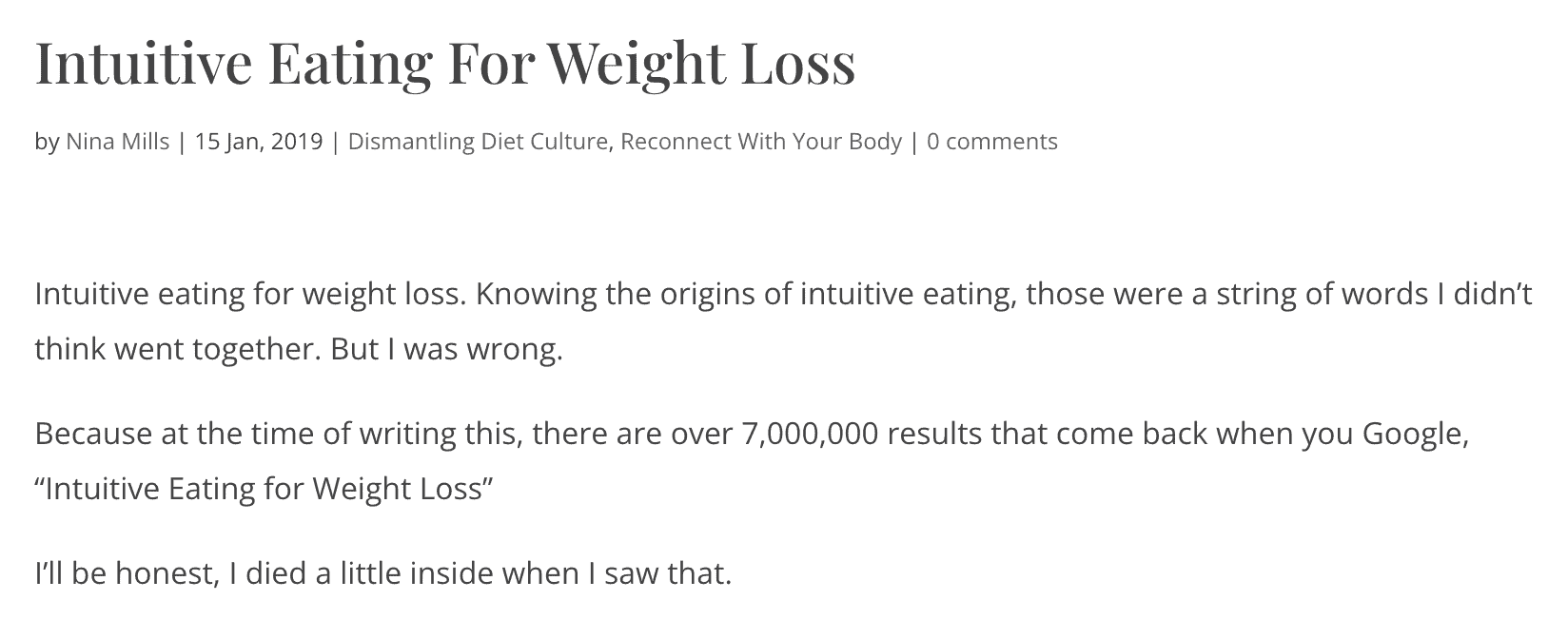Using search engine optimisation (SEO) to get your website in front of your ideal clients and customers and bring in more aligned leads is a smart business move.
But what happens when the more popular keywords (think weight loss, fat loss and of course the ‘O’ words) are dripping in anti-fat bias?
What’s a keyword you ask? It’s the string of words that you type into a search engine like Google, Bing, DuckDuckGo, Pinterest and YouTube when you’re looking for the ‘answer’ to something. e.g. “body positive quotes” or “how to make an iced latte without an espresso machine” (can you tell what’s on my mind while writing this?! ?)
Before you abandon using SEO, let’s take a look at how to choose keywords without colluding with Diet Culture.
First up…
Why might it feel tempting to choose diet-y keywords?
To try and increase site traffic
While not technically a popularity contest, search engines do want to show content that lots of people are interested in.
So, the more sessions and pageviews you get, the more search engines learn that your content is ‘important’ increasing how often they bump up your website in search results. And your traffic can snowball from there.
If we know that diet-related keywords are bigger traffic generators, it can seem like a no-brainer to want to use them. And if your content strategy is to get stacks of pageviews for ad or affiliate revenue, choosing diet-y keywords might be even more tempting.
The inadvertent bait and switch
Look, we’re all on the same page in recognising the harms of anti-fat bias, weight stigma and diets.
This makes it tempting to use certain keywords or hooky titles to get readers to click on our website or posts and then try and ‘convince’ dieters that there’s a better way with our content.
But this is effectively doing a bait and switch which is a bit ick.
To protect people
“I’d rather they come to me than someone who’s going to put them on a diet.”
When we know weight loss is what people are searching for, we can feel compelled to try and rank for those terms so that people book or buy from us instead of a true weight-loss business and be spared harm.
Coming from purely good intentions, keep reading for why this might not be the most helpful strategy.

Here’s why you want an SEO strategy that balances effectiveness with your values:
User intent
User intent refers to the goal or reason behind a person’s search. That reason could be to:
- get information (how long does cooked rice last?)
- find something nearby (dietitian near me) or,
- buy something (probiotics for IBS).
With keywords like weight loss, fat loss etc. we can make a pretty good guess about the user intent.
So, if someone wants information about losing weight, then your anti-diet content is not going to match their intent. Which will result in one of two things:
- they’ll either not click over to your site at all OR,
- they’ll bounce as soon as they get there when they realise the mismatch.
P.S. A high bounce rate is not great for your overall SEO as it tells search engines that your content isn’t what people are looking for and won’t prioritise it in search results.
You’ll get more aligned enquiries and bookings
When you find keywords and create content that is congruent with the search intent of the people you love working with, you’re going to have visitors on your site who want to be there and are keen to go exploring.
Consider the Transtheoretical Model by Prochaska and Di Clemente (aka the Stages of Change) stages of change.
People who are searching for weight loss solutions are pre-contemplative about non-diet approaches. They don’t even realise that there is a ‘problem’ so to speak.
You want to attract people who are contemplative, in preparation, action…
Anything but pre-contemplative.
People who are contemplative know they don’t want to keep doing what they’ve been doing, but they’re not sure what the alternative is.
Or, they know there’s a movement of weight-inclusive, affirming providers and they’re specifically seeking that out.
Bottom line, strategic keywords as part of your SEO strategy = more enquiries and bookings from people who are aligned with your area of practice and your values.
It will make your work more satisfying and increase client retention
Following on from the point above around Stages of Change, I think we can all recall sessions with clients who we have taken on (either by choice or because they were booked into our diary) who were firmly pre-contemplative.
They’re a tough slog.
That’s no shade on the clients themselves or our skills – it’s purely a mismatch between what they want and what you offer. (In the same way, it will probably be a dissatisfying experience if a renal dietitian were to get a client wanting sports nutrition.)
When the clients on our books are ready for or open to our approach, it makes for a much more harmonious experience that’s enjoyable and satisfying.
And that’s more likely to increase client retention.

You won’t confuse Google
The last thing you want is for search engines to think your website is about dieting, weight loss etc because you’re targeting those keywords.
This perpetuates the cycle of low-quality traffic and misaligned enquiries and clients.
Which makes for dissatisfying experiences in your business.
SEO as a culture-making activity
Trying to rank for Diet Culture-related keywords reinforces to search engines that this stuff is important and upholds harmful narratives about bodies.
Doing it differently, not only puts your content and work out there to connect with the people who want to find it, but you’re teaching the algorithms that topics related to Intuitive Eating, Health at Every SizeⓇ, weight-inclusivity, social justice, and non-diet approaches have importance.
This turns our SEO into a culture-making activity.
So, How do you choose SEO keywords that aren’t upholding Diet Culture?
Weeeell, it means we have to be a bit more creative.
But we’re already good at that in working outside of the weight normative paradigm.
Use the keywords your people will be searching for
Incorporate into your website copy and your blog content, the keywords that people who are contemplative or in preparation are typing into search engines.
They are out there searching specifically for ‘HAES dietitian’ or ‘weight-inclusive psychologist’ because they know they want to be connected with providers and businesses who are doing things another way.
User intent works both ways, right? You don’t want them to feel confused and concerned by terms and language because you’re trying to rank for diet culture-related keywords.
You want them to arrive on your site and breathe a sigh of relief that they have landed in a space that understands them and feels like a great match.
Use ‘generic’ keywords
You can use ‘generic’ keywords that relate to fertility, sports nutrition, PCOS, diabetes, mental health, gestational diabetes, gut health etc. and write your content from an anti-diet position.
As an example, I wrote a post for a client on bedtime snacks for gestational diabetes. This topic has nothing about dieting or weight loss in it, nor does it specifically talk about not dieting or Intuitive Eating. But the spirit of compassionate self-care without diets has been infused throughout it.
At the time of this article’s publication, the bedtime snacks post is in position #1 with a featured snippet (aka extra cool SEO juice) because it’s been well-optimised for SEO in other areas.
And this has translated to thousands of pageviews to the website each month (we’re rigging that popularity contest in our favour ?).

Does this mean Diet Culture keywords are off-limits?
In a word, no.
Like everything, this isn’t an all-or-nothing area.
When wanting to be thoughtful about how you use certain keywords as part of your SEO strategy, you want to consider:
- What is my intent here?
- Am I trying to capitalise on search traffic, for search traffics’ sake?
- Am I trying to get in front of people wanting to lose weight and ‘convert’ them? (re-read above as to why this isn’t a great strategy)
- Can I write about this topic or keyword in a way that aligns with my values?
- Is my body of work solid enough in my anti-diet stance that writing on this topic won’t cause friction for my reader?
For example, I’ve got a post over on Feel Good Eating that’s titled “Intuitive Eating for Weight Loss”
I’m pretty confident the user intent for that phrase is to learn how to use Intuitive Eating to lose weight, but given it is a topic that comes up a lot in my sessions and is a question that a lot of ‘beginners’ have – it made sense to address it from a true Intuitive Eating perspective.
It’ll cause anyone who really wants weight loss to bounce, but will piqué the curiosity of people who genuinely want to understand what the deal is with weight loss and Intuitive Eating.

Closing Out
While it can feel frustrating seeing how much traffic Diet Culture-related search terms generate, there are ways to use SEO in your business without compromising your values and practice boundaries.
If you’d like a second set of eyes on your SEO content strategy and copywriting to make sure your messaging is aligned with your values, drop me a note and let’s chat.


